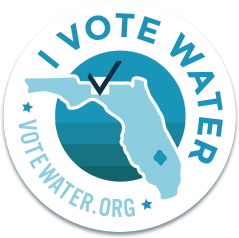Candidate Profile
Supports
Karen Hiltz
Florida House District 34 - REP

2022 General - Voter Guide Ranking
- Candidate
- Q1
- Q2
- Q3
- Q4
- Q5
- DM
- Rating
Karen Hiltz
Florida House District 34 - REP
2022 Clean Water Questionnaire Responses
To read each question, answer and candidate comments click below.
- Question 1 : No1) In response to blue-green algae blooms on Florida's east coast and red tide on the west coast, the State created the Blue-Green Algae and Harmful Algal Bloom/Red Tide Task Forces to study the problem and propose solutions. But only a few of the task forces' recommendations have been adopted. Do you support full implementation of all task force recommendations, including verification/testing of agricultural Best Management Practices and requiring the Florida Department of Environmental Protection to adopt EPA guidelines for blue-green algae toxins as new water quality standards in Florida?
No
- Question 2 : Yes2) The degradation of water quality throughout Florida has in turn led to a significant decline in seagrass, the primary food source for manatees. Starvation became the leading cause of manatee deaths in 2021 and continues today. Despite this, in 2022 the Florida Legislature passed measures which could actually increase nutrient pollution in our waters, and debated a seagrass "mitigation banking" bill that some experts believe could cause a further decline in seagrass. If elected, will you vote against all legislative proposals that could add to the nutrient load in our waters or which in any way could inflict further harm on our seagrasses?
Yes
Candidate Comment:
Recent articles I've read state that efforts to plant seagrass are under way, but the approval process is cumbersome and takes too long. Also, in a conversation I had with Virginia Barker, Brevard County, she stated something to the affect that different environments and conditions along the 156 miles of lagoon will have an impact on the success of seagrass planting. There are many variables to consider. In addition, it appears there are less manatees deaths in 2022 so far.
- Question 3 : No3) State legislation, FDEP data and the Blue-Green Algae Task Force all report that agriculture is the dominant source of phosphorus and nitrogen within impaired watersheds in Florida. Yet the Florida Department of Agriculture and Consumer Services’ best management practices (BMP) program remains voluntary, BMPs have never been field verified to reduce pollution, the state does little to no testing to verify compliance and agricultural producers enrolled in BMPs are afforded the "presumption of compliance." Do you agree industries and property owners should be held to enforceable pollution standards; that BMPs should be mandatory; that the "presumption of compliance" should end and regulators should implement systemic inspection/testing programs?
No
Candidate Comment:
CLARIFICATION: There are several issues in this question and I don't believe there is a one-size-fits-all solution. First, I believe all agriculture should be responsible for their impact on our water sources. Water is vital to the sustainability of human life. It is a fact that chemicals are pollutants not only harmful to our water sources, but to our bodies as well. Second, if there are best management practices (BMP), then they should be applied consistently to the various segments of the agriculture industry. I would not expect the exact same standards to be applicable or applied to plant and animal agriculture in the same manner for the same purpose. They are different in many ways such as grown, harvested, and processed. What should be considered is that responsible management of not only the growth of the product, but the environment in which each is grown and processed. Third, inspections should be done on a regular basis of all agriculture segments and facilities. Safety should be the primary focus whether it be chemical, food source, water, irrigation, etc.
- Question 4 : Yes4) Currently, Florida's largest water users are allowed to extract millions of gallons of water each day without paying anything to the state for the use of our most precious natural resource. Over-pumping has harmed Florida's springs, rivers, estuaries and aquifers and cost Florida taxpayers tens of millions of dollars. Do you support a reasonable fee on permitted water withdrawals to offset the damage caused by over-pumping?
Yes
Candidate Comment:
Many of us pay for the water we use, which is based on consumption. For those who consume more, they should be expected to pay more.
- Question 5 : Yes5) Special interests in Florida spend lavishly to influence elections at the local, state and federal level. The sugar industry, phosphate mining industry and big utilities, among others, spend millions to aid candidates who then back their preferred legislation - too often, at the expense of clean water. Do you agree your campaign will accept no contributions from any source with ties to polluting industries including, but not limited to, the sugar, phosphate and utility industries?
Yes


Candidate Comment:
CLARIFICATION: I've not seen the recommendations, therefore am not able to determine the value or validity of them. I would support testing to be done based on a specified set of standards if the standards are helpful to mitigating and minimizing harmful substances going into our waterways. Regarding EPA guidelines, I need to do some research and have conversations with experts to get a better understanding. I have meet with several individuals and from what I've learned to date, the blue-green algae toxins are a problem and need to be reduced.